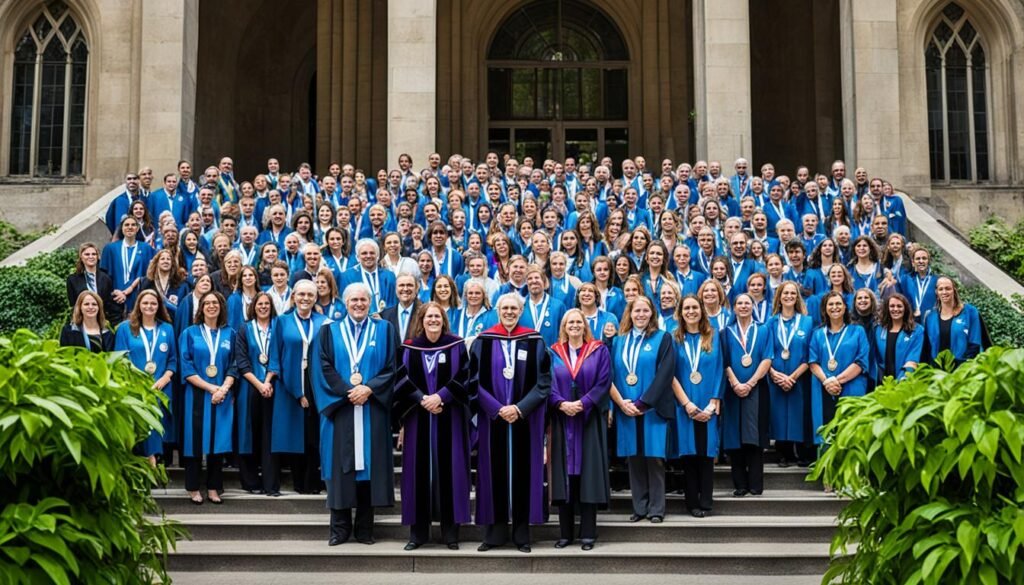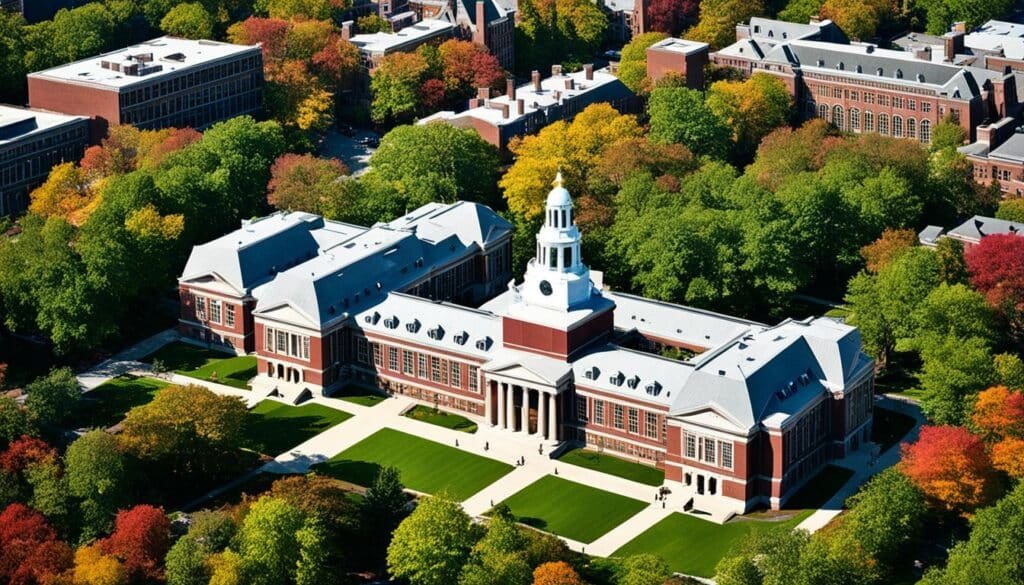Harvard University is a top Ivy League school in Cambridge, Massachusetts. It was founded in 1636, making it the oldest college in the U.S. Harvard is always among the best universities worldwide, ranking first in the 2024 Center for World University Rankings. It’s known for its excellent teachers, groundbreaking research, and students from all over the world.
Harvard has been a key place for learning and leadership for centuries. It helps students become leaders who change the world for the better.
Key Takeaways
- Harvard University is the oldest institution of higher education in the United States, founded in 1636.
- It is a prestigious Ivy League research university located in Cambridge, Massachusetts.
- Harvard has consistently ranked as one of the top universities in the world, holding the number one spot in the 2024 Center for World University Rankings.
- Harvard’s renowned faculty, innovative research, and diverse student body have made it a leader in advancing knowledge and shaping influential leaders.
- The university offers a wide range of undergraduate, graduate, and professional degree programs across its various schools and institutes.
Harvard University: A Prestigious Ivy League Institution
Harvard University was founded in 1636 in Cambridge, Massachusetts. It’s one of the top universities worldwide. It’s known for its academic greatness, groundbreaking research, and for making global leaders.
Ranking and Reputation
In the 2024 Center for World University Rankings, Harvard was named the top university globally for the 13th year in a row. This shows its unmatched academic reputation. It’s often ranked high in systems like the U.S. News & World Report and the Times Higher Education World University Rankings.
History and Founding
Harvard started in the 17th century as the first college in what’s now the U.S. The Puritan clergy founded it to train young men for the ministry. Over time, it became a place for the Boston elite and the academic world in the 18th century.
In 1636, the Massachusetts Bay Colony voted to create a college in Cambridge. They named it after John Harvard, a young minister who left his library and half his estate to the college. The college became a key place for Puritan theology and training clergy, playing a big role in the intellectual and cultural life of the area.
“Harvard University has long been recognized as one of the world’s leading institutions of higher education, known for its academic excellence, innovative research, and distinguished alumni.”
Harvard has changed a lot since its Puritan beginnings. It became a top institution globally, joining the Ivy League in the 18th century and the Association of American Universities in the late 19th century. Charles William Eliot led the university during this time. The university’s fame and impact grew, surviving tough times like the Great Depression and World War II. Today, it’s a leading light in higher education, shaping the world.
Academics and Curriculum

Harvard University offers a wide range of academic programs and curriculum. Students can explore their interests and passions. The Faculty of Arts and Sciences is the largest unit, providing a broad education in the liberal arts and sciences.
Undergraduate Programs
Undergraduate students at Harvard can pick from many majors. These include humanities, social sciences, natural sciences, and engineering. The programs aim to develop critical thinking, problem-solving, and interdisciplinary learning skills.
- Diverse range of undergraduate majors across the arts, sciences, and humanities
- Opportunities for interdisciplinary study and research
- Emphasis on developing essential skills such as critical thinking and communication
Graduate and Professional Schools
Harvard also excels in graduate and professional schools. It has the prestigious Faculty of Arts and Sciences and specialized schools in business, medicine, design, and more. These programs are leaders in research and innovation, drawing top scholars and leaders worldwide.
- Highly ranked graduate programs across various disciplines
- Renowned professional schools in fields like business, medicine, and design
- Innovative research and learning opportunities for postgraduate students
“Harvard’s academic programs are truly exceptional, offering students a world-class education that prepares them for success in their chosen fields.”
Research at Harvard

Harvard University is a leader in research excellence. It has a distinguished faculty, including Nobel laureates and Pulitzer Prize winners. These scholars are experts in their fields and guide students in research.
Faculty and Nobel Laureates
Harvard’s faculty lead innovation, solving global challenges with their research. They have made groundbreaking discoveries, earning Nobel Prizes.
Students at Harvard work with these experts, gaining valuable experience in top labs. This mix of teaching and research makes Harvard special.
Harvard supports research with lots of funding and grants. Its big endowment helps researchers explore new areas.
“The pursuit of knowledge at Harvard is fueled by an unrelenting passion for discovery and a steadfast belief in the transformative power of research.”
| Metric | Value |
|---|---|
| Number of Nobel Laureates | 158 |
| Number of Pulitzer Prize Winners | 54 |
| Annual Research Expenditures | $1.5 billion |
| Number of Research Laboratories | over 700 |
Student Life and Campus
Harvard University is known for its lively student life. It balances academic success with personal growth. The campus, with its Houses and dorms, creates a tight-knit community. This setup helps students meet peers and professors outside class.
Residential Life
Living on campus is key to the Harvard experience. Students pick one of 12 unique Houses to live in. These Houses build a sense of belonging and encourage teamwork and debate.
Harvard also has various dorms for students. These places are cozy and make living easy for students.
Student Organizations and Athletics
Harvard’s life isn’t just about studying. It has many student groups, from clubs to sports teams. If you love sports, arts, or activism, you’ll find a group to join.
Sports are big at Harvard. The Crimson, with over 40 varsity sports teams, competes in top leagues. From football to rowing, Harvard’s athletes shine in sports and academics.
| Student Organizations | Athletics |
|---|---|
|
|
Harvard’s Global Impact

Harvard University’s reach goes far beyond its Cambridge campus. Its renowned alumni, esteemed faculty, and pioneering research have made big marks worldwide. They’ve changed the game in fields like politics, business, science, and the arts.
Harvard’s international partnerships and collaborations have built a global network. This network helps students, researchers, and leaders work on innovative, world-changing initiatives. The university’s global leadership and influence are clear in its work.
Harvard’s grads have become influential figures on the world stage. They hold important roles in governments, companies, and groups all over the globe. The university’s diverse alumni base shows its commitment to diversity, inclusion, and global engagement.
Harvard keeps making a big global impact through its extensive research programs, cutting-edge innovations, and transformative educational opportunities. Its international reach and influence have made it a leading institution worldwide.
| Metric | Value |
|---|---|
| Harvard Alumni Worldwide | 371,000+ |
| Countries Represented by Harvard Alumni | 201 |
| Harvard Faculty Engaged in International Research | 80% |
| Harvard’s International Collaborations and Partnerships | 100+ |
“Harvard’s global impact is a testament to the university’s enduring commitment to excellence, innovation, and the betterment of the world.” – University President, Dr. Bacow
Diversity and Inclusion

Harvard University is deeply committed to creating a diverse and inclusive community. It reflects the global nature of its students and faculty. The university has many initiatives to make sure students from all backgrounds can access its top education.
Commitment to Access and Affordability
Harvard wants to make its top education available to students from different backgrounds and economic statuses. It has a big financial aid program. This program gives need-based grants and scholarships to help students from underrepresented communities pay for school.
- Harvard’s financial aid program means students from families earning less than $75,000 a year don’t pay tuition, fees, or room and board.
- The university also gives need-based aid to students from middle-income families. This makes a Harvard education affordable for many backgrounds.
- Harvard is committed to equity and inclusion. It wants to give equal opportunities to students from various backgrounds. This way, they can join the inclusive community and use the university’s top resources.
By focusing on diversity and inclusion, Harvard University aims to build an inclusive community. This community helps students from all backgrounds succeed and achieve their goals.
“Harvard is committed to creating a diverse, inclusive, and equitable community where all students can reach their full potential and contribute to the betterment of the world.”
Harvard Alumni: Shaping the World

Harvard University has a long list of alumni who have made big impacts in many areas. These alumni are a mix of leaders, innovators, and change-makers. They’ve changed the world in politics, business, science, arts, and culture.
Notable Alumni Achievements
Harvard’s alumni list includes many Nobel laureates, Pulitzer Prize winners, Academy Award winners, and Olympic medalists. They’ve expanded human knowledge and made big achievements in their fields.
- Former U.S. President Barack Obama, a Nobel Peace Prize laureate, who championed issues of social justice and equality during his tenure.
- Playwright and screenwriter Arthur Miller, whose works, such as “Death of a Salesman,” have become enduring classics of American literature.
- Mathematician and computer scientist Grace Hopper, a pioneer in the field of computer programming and a rear admiral in the U.S. Navy.
| Notable Harvard Alumni | Field | Achievements |
|---|---|---|
| T.S. Eliot | Literature | Nobel Prize in Literature, Pulitzer Prize for Poetry |
| Bill Gates | Technology | Co-founder of Microsoft, Philanthropist |
| Yo-Yo Ma | Music | Grammy Award-winning cellist, Presidential Medal of Freedom |
Harvard’s alumni have always shown they are leaders, innovators, and change-makers. They’ve left a lasting impact on the world. They also inspire others to aim high.
“The future belongs to those who believe in the beauty of their dreams.”
– Eleanor Roosevelt, Harvard alumna
Harvard Innovation and Entrepreneurship

Harvard University is a key place for innovation and entrepreneurship. It has created a vibrant ecosystem that brings to life new technologies, business models, and solutions to big global problems. The university’s drive to explore new knowledge has sparked a culture of innovation and entrepreneurship that goes beyond its walls.
Harvard’s entrepreneurial spirit is fueled by a strong network of startups, accelerators, and research hubs. These offer the support, guidance, and funds needed for new ideas to grow. Students and faculty work together to bring their ideas to life, focusing on solving big global issues with technology and research.
Harvard supports innovation and entrepreneurship with many programs, competitions, and funding sources. These efforts help the next leaders of innovation grow. They also use Harvard’s wide global impact to spread the work of its entrepreneurial community.
“Harvard has always been at the forefront of innovation, and our commitment to fostering a culture of entrepreneurship is unwavering. We believe that the best solutions to the world’s most pressing challenges often emerge from bold, unconventional thinking.”
As the world changes fast, Harvard keeps leading in innovation and entrepreneurship. It shapes the future with bold ideas, the courage to take risks, and the power of technology and research.
Also Read : What Online Learning Options Are Available At The University Of Fort Lauderdale?
Harvard University Libraries and Museums

Harvard University is famous for its top-notch academic programs. It also has a vast library system that supports research and learning. This system has over 73 million books, 400 million manuscripts, and much more. It’s the biggest private library system in the world.
A Treasure Trove of Knowledge
There are 73 libraries at Harvard, including the famous Widener Library. These libraries are key for research and keeping knowledge safe. They offer academic and global access to a huge collection of resources.
- The libraries have a huge collection of books, journals, and digital stuff. They cover many academic areas.
- The museums at Harvard, like the Harvard Art Museums and the Harvard Museum of Natural History, show off the university’s diverse collections and cultural influence.
- These libraries and museums are key for research and academic work at Harvard. They help students, teachers, and people all over the world.
Harvard is dedicated to keeping and sharing knowledge. Its library and museum resources inspire and teach scholars and people who want to learn more.
“The Harvard Library is not only a testament to the university’s rich history and scholarly tradition, but also a dynamic hub of research, innovation, and global influence.”
Conclusion
Harvard University is a top name in the world of higher learning. It’s known for its drive for excellence, innovation, and making a global impact. Since it was founded in 1636, it has led the way in expanding knowledge. This has shaped history through the work of its students, teachers, and alumni.
As a top Ivy League school, Harvard sets the bar high in education. It offers unmatched learning opportunities, groundbreaking research, and a welcoming community. This community helps shape future leaders, innovators, and those who want to make a difference. Harvard’s influence is seen everywhere, as its graduates excel in many areas and help their communities.
Looking ahead, Harvard University is still focused on its mission to advance knowledge and positively impact the world. It will keep pushing for excellence, innovation, and global involvement. Harvard will continue to be a key player in education, research, and progress for many years to come.
FAQs
Q: What is the history of Harvard University and when was Harvard founded?
A: Harvard University, located in Cambridge, Massachusetts, was founded in 1636 and is recognized as the oldest institution of higher education in the United States.
Q: What types of programs can students pursue at Harvard College?
A: At Harvard College, students can pursue a variety of undergraduate programs across different disciplines, including those offered by the Graduate School of Arts and the School of Arts and Sciences.
Q: What are some notable features of Harvard Square?
A: Harvard Square is a vibrant area near Harvard College that offers a mix of shops, restaurants, and cultural venues, making it an integral part of the student experience for Harvard students.
Q: How does the admissions process work for prospective students attending Harvard?
A: The admissions process for Harvard is highly competitive, involving a comprehensive review of academic performance, extracurricular activities, personal essays, and recommendations.
Q: What resources are available for graduate students at Harvard?
A: Harvard offers numerous resources for graduate students, including access to the Radcliffe Institute for Advanced Study, the Harvard Innovation Labs, and extensive research facilities across various fields.
Q: Can you tell me about the Harvard Crimson and its significance?
A: The Harvard Crimson is the university’s student-run newspaper, founded in 1873, and serves as an important platform for student voices and campus news at Harvard College.
Q: What opportunities exist for students at Harvard to make a difference globally?
A: Harvard provides various programs and initiatives that empower students and alumni to engage in global issues, including research projects, internships, and partnerships with international organizations.
Q: What is the significance of Harvard Stadium in relation to student life?
A: Harvard Stadium, built in 1903, serves as a historic venue for Harvard’s athletic events and is a popular gathering place for students, enhancing the vibrant campus life at Harvard College.
Q: How does the curriculum at Harvard support a diverse student body?
A: Harvard’s curriculum is designed to be inclusive and diverse, allowing students from various backgrounds to engage in a broad range of subjects while fostering an environment of collaboration and innovation.
Q: What is the relationship between Harvard and Rhodes Scholars?
A: Harvard has a strong tradition of producing Rhodes Scholars, who are recognized for their academic excellence and leadership potential, further emphasizing the university’s commitment to developing future heads of state and global leaders.
Source Links
- https://www.forbes.com/sites/michaeltnietzel/2024/05/14/harvard-again-tops-a-global-ranking-of-universities/
- https://college.harvard.edu/admissions/why-harvard
- https://en.wikipedia.org/wiki/Harvard_University





